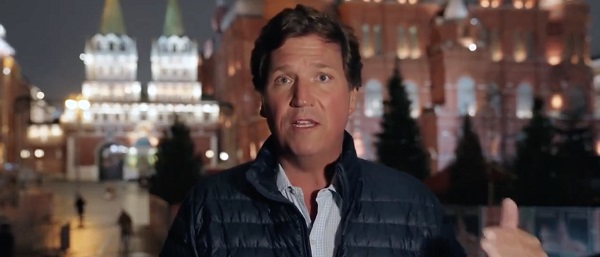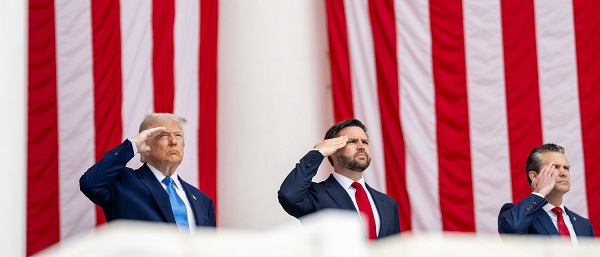conflict
‘We Are In A Hot War With Russia’: Tucker Carlson Is Back In Moscow With A Terrifying Revelation


From the Daily Caller News Foundation
By Hailey Gomez
Daily Caller News Foundation co-founder Tucker Carlson released a video on social media Tuesday from Moscow, revealing how the U.S. government has not only severed all communication ties with Russia but also prevented Ukrainian President Volodymyr Zelenskyy from interviewing with Carlson and his team.
Tensions between Russia and Ukraine escalated last month after President Joe Biden authorized Ukraine to use U.S.-supplied long-range missiles on Nov. 17 for strikes inside Russia. In a video posted to X, Carlson told viewers how U.S. involvement in the conflict has brought everyone closer to a nuclear confrontation since he last interviewed Russian President Vladimir Putin in February.
“In that time, just a few weeks ago, the Biden administration, American military personnel launched missiles into mainland Russia and killed at least a dozen Russian soldiers. So we are, unbeknownst to most Americans, in a hot war with Russia, an undeclared war, a war you did not vote for and that most Americans don’t want, but it is ongoing,” Carlson said. “Because of that war, because of the fact that the U.S. military is killing Russians in Russia right now, we are closer to nuclear war than at any time in history, far closer than we were during the Cuban Missile Crisis.”
Carlson went on to highlight how, despite believing that someone in Washington, D.C., was behind the push toward nuclear war, he had uncovered that U.S. Secretary of State Antony Blinken had cut off “all contact” between Russia and the United States.
“We felt there must be someone behind the scenes in Washington working to make sure that this conflict doesn’t become a nuclear holocaust. But we found out that no, in fact, there is nobody. Tony Blinken, the current secretary of state, cut off all contact between the U.S. and Russian governments. There is no back channel. There is no conversation. There hasn’t been for more than two years,” Carlson said.
WATCH:
“Meanwhile, most Americans have no access to any perspective other than that granted to them by NBC News and The New York Times. They don’t know how close we are. They don’t know the Russian perspective,” Carlson said. “We’ve been trying for over a year to get that perspective out to American news consumers.”
Carlson also noted that he had been attempting for over a year to interview Zelenskyy but had been “thwarted” by the U.S. government’s involvement.
“The American embassy in Kiev, which our tax dollars pay for, told the Zelenskyy government, ‘No, you may not do the interview.’ You can talk to CNN. You can’t talk to us. So we’ve been unable to speak to him,” Carlson said.
“So we came back to Moscow yesterday to interview the foreign minister of Russia, Sergei Lavrov, the longest serving foreign minister in the world … and ask him, where exactly are we? Are we headed toward an unprecedented conflict between Russia and the United States? Is there any way to peel Russia back from the east, from the sphere of China, back in to the west? Is that alliance permanent? Does the election of Donald Trump mean an end to this war, which is reshaping the world, the U.S. economy, the global economy and risking the life of every person on this planet? Is that possible? We just walked out of that interview,” Carlson added. “It’s absolutely fascinating.”
Talks of nuclear war surfaced after Biden authorized the use of U.S. long-range missiles for Ukraine, with Putin warning Ukraine about the potential use of new hypersonic missiles to target government or official buildings in Kyiv. Despite the signaling from Putin, U.S. intelligence sources allegedly told Reuters in late November that the decision to allow Ukraine the use of U.S. missiles has not increased the risk of nuclear war.
On Monday, Blinken headed back to Europe for what is likely his final high-level NATO meeting to discuss “priorities for transatlantic security, including supporting Ukraine’s fight against Russia’s invasion, deepening cooperation with NATO’s southern partners in the Middle East, North Africa, and Sahel regions, and preparing for the upcoming summit at The Hague,” the Associated Press reported.
Artificial Intelligence
AI Drone ‘Swarms’ Unleashed On Ukraine Battlefields, Marking New Era Of Warfare


From the Daily Caller News Foundation
Artificial intelligence-powered drones are making their first appearances on the battlefield in the Russia-Ukraine war as warfare creeps closer to full automation.
In bombardments on Russian targets in the past year, Ukrainian drones acting in concert were able to independently determine where to strike without human input.
It’s the first battlefield use of AI “swarm” technology in a real-world environment, a senior Ukrainian official and Swarmer, the company who makes the software, told the Wall Street Journal in a Tuesday report. While drones have increasingly defined modern battlefields, swarms until now had been confined to testing rather than combat.
“You set the target and the drones do the rest,” Swarmer Chief Executive Serhii Kupriienko told the WSJ. “They work together, they adapt.”
So far, the Swarmer technology has been used hundreds of times to target Russia assets, but was first used a year ago to lay mines on the front, the Ukrainian official told the WSJ. The software has been tested with up to 25 drones at once, but is usually utilized with only three.
Kupriienko told the WSJ that he was preparing to test up to 100 drones at once with the linking software.
A common arrangement used on the battlefield includes one reconnaissance drone to scout out the target and two explosive drones delivering the payload on target, the official told the WSJ.
While Western nations such as the U.S., France and the United Kingdom are also pursuing drone swarm technology, they have not deployed swarm technology on the battlefield the way Ukraine has, according to the WSJ. Currently, autonomous weapons are not regulated by any international authority or binding agreement, but ethical concerns around the technology has led many to call for increased regulation of weapons like the Swarmer system.
The Ukrainian Ministry of Foreign Affairs did not immediately respond to the Daily Caller News Foundation’s request for comment.
conflict
Trump Pentagon Reportedly Blocking Ukraine From Firing Western Missiles Deep Into Russia


From the Daily Caller News Foundation
The Department of Defense has spent months blocking the Ukrainian military from using American and British-made missiles to hit targets deep inside Russia, The Wall Street Journal reported Sunday, citing unnamed U.S. officials.
Undersecretary of Defense for Policy Eldridge Colby reportedly designed the procedure to review requests to carry out the long-range strikes with weapons that are either of U.S. origin or that require American intelligence or use components provided by the U.S., according to the WSJ. Secretary of Defense Pete Hegseth reportedly has the final say on whether Ukrainian forces can use the MGM-140 ATACMS (Army Tactical Missile System) to hit targets in Russia.
The reported blocks on missile strikes coincides with a Trump administration effort to broker a peace deal between Russia and Ukraine. A Pentagon spokesperson declined to comment further on the matter.
BREAKING: President Vladimir Putin reacts to B-2 Flyover pic.twitter.com/1mzVn7DxlW
— Jack Poso 🇺🇸 (@JackPosobiec) August 15, 2025
The Biden administration allowed Ukraine to carry out strikes with ATACMS in November, weeks after President Donald Trump won the 2024 election, the New York Times reported. Trump criticized the move during a December interview with Time magazine.
“It’s crazy what’s taking place. It’s crazy,” Trump said. “I disagree very vehemently with sending missiles hundreds of miles into Russia. Why are we doing that? We’re just escalating this war and making it worse. That should not have been allowed to be done.”
Trump and Russian President Vladimir Putin met in Alaska on Aug. 15 for a summit meeting during which Trump sought to secure a cease-fire in Russia’s war with Ukraine. As Trump greeted Putin, a B-2A Spirit stealth bomber and several fighters carried out a flyover of Elmendorf Air Force Base.
Trump met with Ukrainian President Volodymyr Zelensky and major European leaders on Aug. 18 to update them on the summit.
In July, Trump reached an agreement with NATO where members of the alliance would purchase weapons, including MIM-104 Patriot surface-to-air missiles, and donate them to Ukraine.
-

 Business1 day ago
Business1 day ago“Magnitude cannot be overstated”: Minnesota aid scam may reach $9 billion
-

 Censorship Industrial Complex22 hours ago
Censorship Industrial Complex22 hours agoUS Under Secretary of State Slams UK and EU Over Online Speech Regulation, Announces Release of Files on Past Censorship Efforts
-

 Haultain Research46 mins ago
Haultain Research46 mins agoSweden Fixed What Canada Won’t Even Name
-

 Business1 day ago
Business1 day agoLargest fraud in US history? Independent Journalist visits numerous daycare centres with no children, revealing massive scam
-

 Business2 days ago
Business2 days agoSocialism vs. Capitalism
-

 Energy2 days ago
Energy2 days agoCanada’s debate on energy levelled up in 2025
-

 Daily Caller2 days ago
Daily Caller2 days agoIs Ukraine Peace Deal Doomed Before Zelenskyy And Trump Even Meet At Mar-A-Lago?
-

 Business36 mins ago
Business36 mins agoWhat Do Loyalty Rewards Programs Cost Us?








